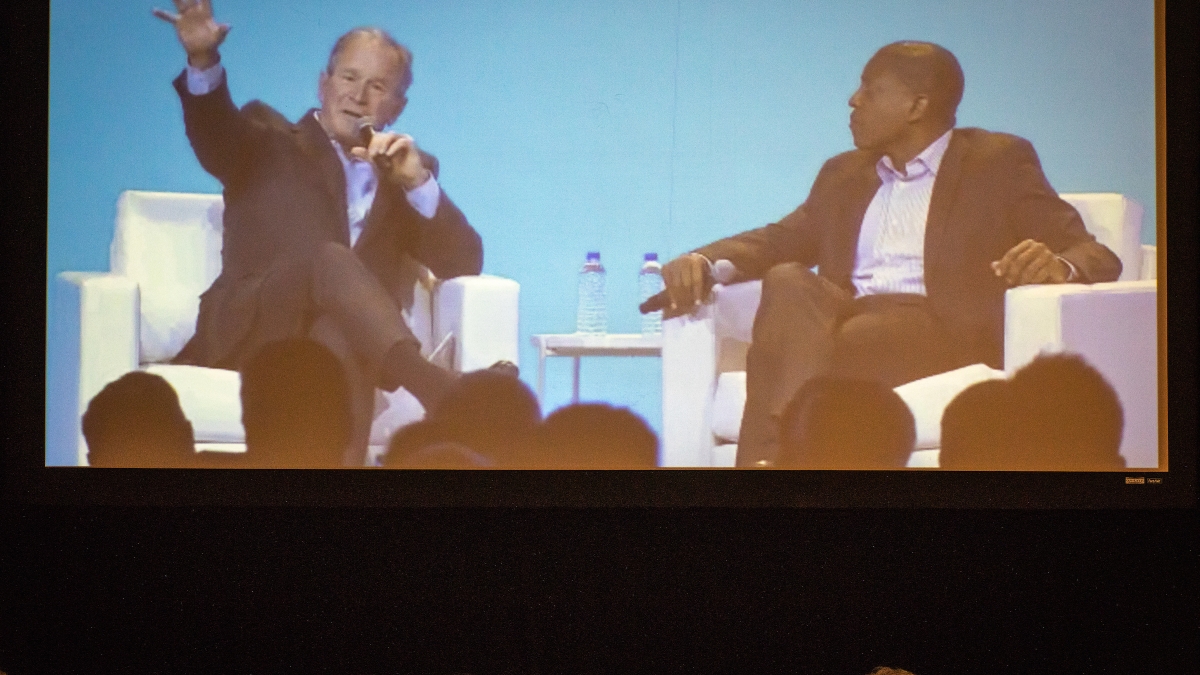Bush reflects on the successes, regrets of his presidency during ASU + GSV keynote

Editor's note: Read more of the highlights from the ASU + GSV Summit on our blog.
Former President George W. Bush said that the education reform passed during his administration, known as No Child Left Behind, was one of the most significant pieces of civil rights legislation ever approved.
The bipartisan act, passed in 2002, established K-12 standards that had to be proven through assessments, with the results tied to federal funding.
Bush told a crowd at the ASU + GSV Summit in San Diego on Monday night that the law took “an optimistic view of people being able to learn.”
“For the first time, in return for money, people had to show results,” he said.
“A lot of times, districts that don’t measure allow kids to graduate without any sense of accomplishment, and they tend to be inner-city kids or kids whose parents don’t speak English as a first language,” he said.
“And so finally, somebody came along and said, ‘Measure.’ ”
Bush said that although the law should have been fine-tuned, it has been successful.
“Maybe there was over-testing, but I know this: For a period of time, the achievement gap started to close because of No Child Left Behind.”
The 43rd president spoke on a wide range of topics during the keynote chat.
On what he was not able to accomplish as president:
“Immigration reform. I understand that there are people willing to do work that Americans won’t do. If you go to Dallas in 104 degrees, there aren’t a lot of Americans laying tar. I proposed in 2005 that people ought to be allowed the right to earn a place in line to become a citizen over time.
“I think people were angry that the economy wasn’t growing. It started squeezing people, who said, ‘Who can I blame?’ They blamed the government. They blamed trade, and they blamed immigrants.
“People say, ‘Why aren’t you speaking out on it?’ We have citizenship ceremonies at the Bush Center. I can’t think of a better speech to give than to stand up with two Mexicans who just became citizens while wearing Marine uniforms. If somebody is willing to die for our country, we ought to say, ‘Yes, welcome.’ ”
On his hobby of painting:
“Five years ago, I was antsy. I tried to stay fit, but it wasn’t enough. I read Winston Churchill’s essay, ‘Painting as a Pastime’ and I said, ‘If that guy can paint, so can I.’
“I picked up a paintbrush and I painted a cube. It was an unbelievably liberating experience. I paint all the time.
“I published a book called ‘Portraits of Courage.’ It’s to raise money for veterans’ programs at the Bush Library. It’s the faces of 98 veterans, all of whom I’ve gotten to know through mountain biking or golf. All of whom I admire a lot.
“It took me a year to paint them all. Some of them need help, particularly with post-traumatic stress. And that’s what the book is about — how to help a vet with post-traumatic stress.”
On remembering the day of the 9/11 terrorist attacks, when he was visiting a school in Florida:
“There was a child reading to me. All of sudden the press corps in this crowded classroom was getting the same message I got.
“I had been in crises before, and the first lesson is to project calm. The second lesson is you have to say something. So I wrote a statement.
“In an instant, I became a wartime president. I made a lot of tough calls. A lot.
“Sitting in that classroom, I made a vow to protect that child, her family and the country in which she lived. That was how I conducted my presidency.”
On his mother, 92-year-old Barbara Bush, who has decided to stop treatment for chronic obstructive pulmonary disease (Editor's note: Former first lady Barbara Bush died the day after this interview):
“She’s had a spectacular life, and she does not fear death.
“I’m at peace, and the reason I’m at peace is because she’s at peace.”
Top photo: An overflow room filled with more than 500 people listen to an often-comical former President George W. Bush reminisce with Ozy Media CEO Carlos Watson during the keynote fireside chat at the ASU + GSV Summit 2018 in San Diego on Monday evening (no cameras were allowed in the main event room). The two covered a variety of subjects including No Child Left Behind — the achievement gap between the low- and high-achieving students started to close; regrets — he was not able to pass comprehensive immigration reform; and the Great Recession — "I wanted to be Roosevelt, not Hoover." Photo by Charlie Leight/ASU Now
More Law, journalism and politics

ASU committed to advancing free speech
A core pillar of democracy and our concept as a nation has always been freedom — that includes freedom of speech. But what does that really mean?Higher education doesn’t have an agenda to curate a…

ASU experts share insights on gender equality across the globe
International Women’s Day has its roots in the American labor movement. In 1908, 15,000 women in New York City marched to protest against dangerous working conditions, better pay and the right to…

ASU Law to offer its JD part time and online, addressing critical legal shortages and public service
The Sandra Day O’Connor College of Law at Arizona State University, ranked 15th among the nation’s top public law schools, announced today a new part-time and fully online option for its juris doctor…

